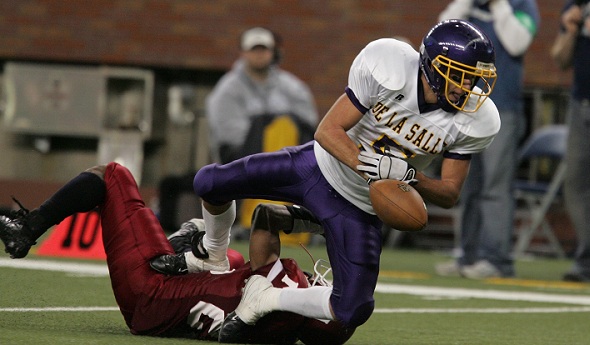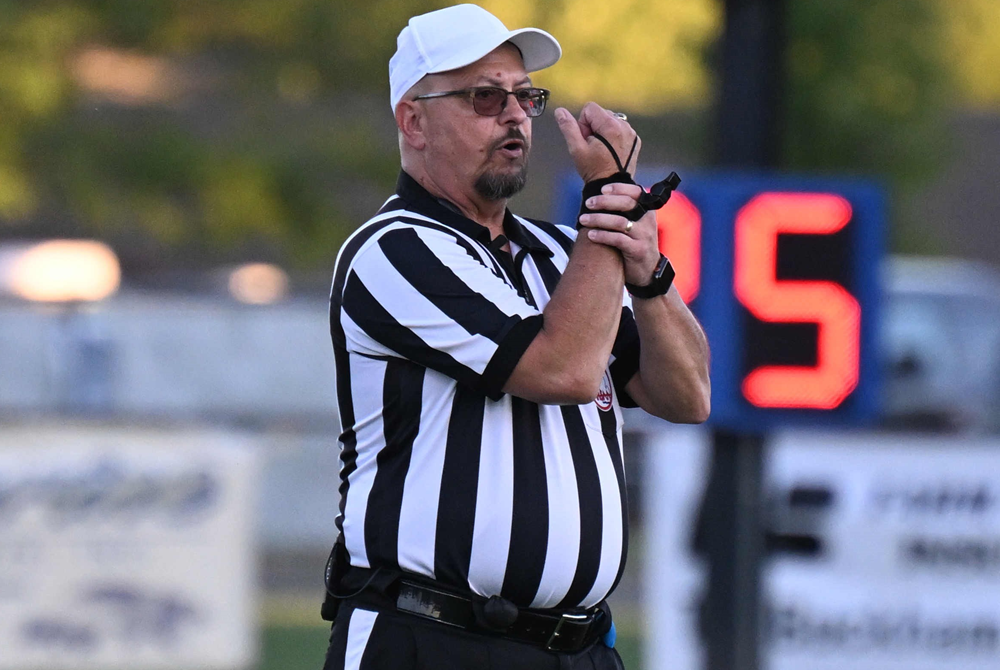
The Right Stuff at the Right Time
October 19, 2012
By Rob Kaminski
MHSAA benchmarks editor
MHSAA Championship history is filled with unforgettable moments for participants and spectators alike. Every now and then, the contest on the biggest stage delivers the cliche’ finish of everyone's dreams: close game, final seconds, trophy on the line, someone’s gotta win, someone’s gotta lose.
For the three teams out there, it’s as exciting as it gets. Yes, three teams. For every classic crunch-time moment, there are officials who have earned the right to share that moment with the participants.
Following, benchmarks reflects on two such moments from the viewpoints of those in stripes.
Ford Field, Detroit, Nov. 24, 2006
Muskegon (13-0) vs. Warren DeLaSalle (11-2)
At Stake: MHSAA Division 2 Football Title
Officials: Referee Charles Sprang (3rd MHSAA Final); Umpire Mike Wallace (1st); Linesman Troy Miller (2nd); Line Judge Reginald Smith (1st); Back Judge Trenton Withrow (1st)
THE MOMENT: DeLaSalle trails 32-30 with time running out, when QB Brian Lewis completes a slant pass to Don Fowler. Fowler is into the clear and headed for the end zone when he is hit by Muskegon’s Ronald Johnson at the 4-yard line, and stretches for the end zone. The ball pops loose, Fowler’s knee goes down, and Muskegon’s Bobby Miller recovers the ball in the end zone within a few furious seconds. The Big Reds get the ball, the undefeated season, and the championship.
Withrow: “They were in a hurry-up on the last drive and the game, which was fast-paced the entire time, got even faster. When the receiver got into the open, I knew I had to get back to the goal line and keep my eyes on the play. That was the first thing on my mind; if I don’t get to the goal line, I can’t make that call.
“Immediately after I made the call (correctly, a fumble and touchback), I just remember chills down my spine, the DeLaSalle kids trying to argue that he was down, and hoping I got it right. We don’t have the luxury of replay. It was a bang-bang call; knee coming down, lost ball, goal line right there.”
Smith: “As the play took place, I was telling myself not to rush, but be precise in my call. Just move in to box the play with Trent and watch for the ball at all times as the play developed.”
Sprang: “I did not see the fumble as I was about 60 yards up field. I got to Trent and said, ‘What do you have?’ Trent said, ‘Touchback.’ Mike Wallace asked, ‘Are you sure?’ Trent never wavered and said, ‘He never got in the end zone with the ball. It was out at the 1.’ I asked again, ‘Are you sure?’ Trent said, ‘No doubt.’ Trent, as I saw on film, was in perfect position. That call was the game and he nailed it.”
Miller: “It was great that Reggie and Trent spent very little time communicating and they had the same ruling. Being on the Warren DeLaSalle sideline, I explained to the head coach what we had and there was really no reaction, as I believe he saw exactly what Trent had seen, and knew that Trent was in great position.”
Wallace: “I just remember seeing the play from a distance as I was the umpire. I saw the call and just said to myself, ‘I hope that was the right call.’ I didn't have any doubt, but just didn't want a call missed at that point in the game. The call was so smooth, as if he had made the call a hundred times.
 “Moments afterward I just remember telling him ‘That was a heck-of-a-call,’ and I was not even sure if he got it right or not.”
“Moments afterward I just remember telling him ‘That was a heck-of-a-call,’ and I was not even sure if he got it right or not.”
Withrow: “I’ll never forget when Mike came running down the field, he said, ‘That’s why I’m glad I’m the umpire; so I don’t have to make that call.’
“Chuck and I discussed it, and he just wanted to make sure of what I saw; I told him exactly what happened, and then he repeated the signal.”
Sprang: “At every opportunity, we talked about ‘staying in the game.’ Muskegon had a two touchdown lead twice in the game and DeLaSalle fought back each time to either tie or go ahead. I am not sure if Mike Wallace had a crystal ball, but he said, ‘One play is gonna win this game, be ready.’”
Miller: “I remember walking up the tunnel going back to the locker room and walking past a reporter from one of the Detroit papers and having him say, ‘Nice job guys, that was a great call.’”
Sprang: “I knew at that point Trent had it right and the replay only confirmed it. When I saw the replay, it sure was a great feeling to see that ball pop out at the 1-yard line and Trent on the goal line with his bean bag. He made four other guys on the field that day look very, very good.”
Withrow: “Looking at the replay, I was surprised my bean bag came out, because I didn't remember that during the play. It’s a reaction, and I just relied on mechanics. If you do all the right things mechanically, you’ll be in position to make the calls, and it certainly paid off at that moment.”
Wallace: “In the locker room it felt like we just went 15 rounds with Apollo Creed and we were still standing. We knew that we all worked hard, concentrated and nailed it. Maybe it was just that one call, but it was an incredible feeling of success that you strive for when you officiate.”
Breslin Center, East Lansing, March 27, 1999
Muskegon Western Michigan Christian (25-2) vs. Detroit City (22-3)
At Stake: MHSAA Class D Boys Basketball Title
Officials: Dick Kalahar (4th MHSAA Boys Final), Mike Robillard (2nd), Tim Belt (1st)
THE MOMENT: Game tied, clock ticking down, as Muskegon Western Michigan Christian’s Nick Bultema uses a screen and goes airborne to launch a last-second three-point shot. The ball is tipped by Detroit City’s Michael Williams, but momentum takes his body into Bultema’s before the shooter reaches the floor. Foul. 0:00 on the clock. Bultema makes the second free throw, and secures the title.
Kalahar: “I was the trail official, and as the clock was winding down I was looking for a three-point shot, as Detroit City’s defense on the inside was very good. As the player (Bultema) attempted the shot, a very big Detroit City player tried to block the shot. The WMC shooter was still in the air after releasing the ball, when the Detroit City player contacted the shooter and drove him into the table at press row.
 “I made a foul call on the Detroit City player just before the horn went off. Before I went to the table to report the foul, I met with Mike and Tim to confirm the foul was called before time ran out. We all agreed there would be three shots given to the WMC player.”
“I made a foul call on the Detroit City player just before the horn went off. Before I went to the table to report the foul, I met with Mike and Tim to confirm the foul was called before time ran out. We all agreed there would be three shots given to the WMC player.”
Robillard: “I knew going into the game I was with two outstanding officials, and we would handle any situations that might occur. As the game was getting into the final minutes I was hoping for overtime because both teams had competed so hard and the game had such a great flow.”
Kalahar: “I reported the foul and explained to the table what we were going to do. I also called both head coaches together to explain what the call was and how we would proceed. Both coaches were gentlemen.”
Robillard: “As the end of the game approached, our crew communication was outstanding. We knew we had to be out on the perimeter and protect the shooters. So when the left-handed shooter pulled up behind the three-point arc, both Dick and I had him booked in. It was Dick's primary, but I was doubling back to protect the backside of the shooter. As soon as the defender ran into the shooter, Dick nailed the whistle.”
Kalahar: “Experience always helps. Trying to anticipate what might happen as well as good concentration in a game like this comes with experience. Having two good partners is also a key.
“As we entered the locker room, much to my surprise, Jack Roberts, Nate Hampton and Tom Minter of the MHSAA office were there. I will always remember their support. Our crew then talked about the game, and felt we gave the teams a good game. Mike or Tim told me they thought the last call took courage and they were proud to be a part of this crew.
“I had some very anxious moments the first time I saw the replay. As officials, we always want to get the call right, especially in a game like this. I've seen it many times, and to this day I believe the right and fair call was made.”
PHOTOS: (Top) Warren DeLaSalle's Don Fowler loses control of the ball just before reaching the goalline during the 2006 Division 2 Final at Ford Field. (Middle) Muskegon Western Michigan Christian's Nick Bultema is about to be engulfed by a teammate moments after sinking the winning free throw during the 1999 Class D Final at the Breslin Center.
NOTE: This is the fourth installment in the series "Making – and Answering – the Call" detailing the careers and service of MHSAA officials. Click the links below to view the others.

Be the Referee: Football Holding
By
Sam Davis
MHSAA Director of Officials
August 27, 2024
Be The Referee is a series of short messages designed to help educate people on the rules of different sports, to help them better understand the art of officiating, and to recruit officials.
Below is this week's segment – Football Holding - Listen
In football, it’s often said that holding happens on every play. But does it?
When an offensive player uses their hands or arms to illegally restrain a defensive player – that’s holding. This typically happens when blockers grab or pull defensive players away from their path – impeding their ability to make a play. The penalty is 10 yards from the previous spot.
Defensive players can be flagged for holding as well. That’s also a 10-yard penalty. An example of defensive holding is when a cornerback grabs a receiver to slow him down before the ball is thrown. If that same contact happens while the pass is in the air – then it’s pass interference. Defensive pass interference is a 15-yard penalty.
PHOTO A football official signals holding during a 2023 game. (Photo by Gary Shook.)

